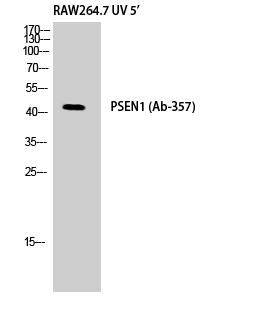Total PS-1 Cell-Based Colorimetric ELISA Kit
- Catalog No.:KA3363C
- Applications:ELISA
- Reactivity:Human
- Gene Name:
- PSEN1
- Human Gene Id:
- 5663
- Human Swiss Prot No:
- P49768
- Mouse Swiss Prot No:
- P49769
- Storage Stability:
- 2-8°C/6 months
- Other Name:
- Presenilin-1 (PS-1) (EC 3.4.23.-) (Protein S182) [Cleaved into: Presenilin-1 NTF subunit;Presenilin-1 CTF subunit;Presenilin-1 CTF12 (PS1-CTF12)]
- Detection Method:
- Colorimetric
- Background:
- disease:Defects in PSEN1 are a cause of Alzheimer disease type 3 (AD3) [MIM:607822]. AD3 is a familial early-onset form of Alzheimer disease. Alzheimer disease is a neurodegenerative disorder characterized by progressive dementia, loss of cognitve abilities, and deposition of fibrillar amyloid proteins as intraneuronal neurofibrillary tangles, extracellular amyloid plaques and vascular amyloid deposits. The major constituent of these plaques is the neurotoxic amyloid-beta-APP 40-42 peptide (s), derived proteolytically from the transmembrane precursor protein APP by sequential secretase processing. The cytotoxic C-terminal fragments (CTFs) and the caspase-cleaved products such as C31 derived from APP, are also implicated in neuronal death.,disease:Defects in PSEN1 are a cause of frontotemporal dementia [MIM:600274].,domain:The PAL motif is required for normal active site conformation.,function:Probable catalytic subunit of the gamma-secretase complex, an endoprotease complex that catalyzes the intramembrane cleavage of integral membrane proteins such as Notch receptors and APP (beta-amyloid precursor protein). Requires the other members of the gamma-secretase complex to have a protease activity. May play a role in intracellular signaling and gene expression or in linking chromatin to the nuclear membrane. Stimulates cell-cell adhesion though its association with the E-cadherin/catenin complex. Under conditions of apoptosis or calcium influx, cleaves E-cadherin promoting the disassembly of the E-cadherin/catenin complex and increasing the pool of cytoplasmic beta-catenin, thus negatively regulating Wnt signaling. May also play a role in hematopoiesis.,online information:Presenilins mutations,PTM:After endoproteolysis, the C-terminal fragment (CTF) is phosphorylated on serine residues by PKA and/or PKC. Phosphorylation on Ser-346 inhibits endoproteolysis.,PTM:Heterogeneous proteolytic processing generates N-terminal (NTF) and C-terminal (CTF) fragments of approximately 35 and 20 kDa, respectively. During apoptosis, the C-terminal fragment (CTF) is further cleaved by caspase-3 to produce the fragment, PS1-CTF12.,similarity:Belongs to the peptidase A22A family.,subcellular location:Bound to NOTCH1 also at the cell surface. Colocalizes with CDH1/2 at sites of cell-cell contact. Colocalizes with CTNNB1 in the endoplasmic reticulum and the proximity of the plasma membrane. Also present in azurophil granules of neutrophils.,subunit:Homodimer. Component of the gamma-secretase complex, a complex composed of a presenilin homodimer (PSEN1 or PSEN2), nicastrin (NCSTN), APH1 (APH1A or APH1B) and PEN2. Such minimal complex is sufficient for secretase activity. Other components which are associated with the complex include SLC25A64, SLC5A7, PHB and PSEN1 isoform 3. Predominantly heterodimer of a N-terminal (NTF) and a C-terminal (CTF) endoproteolytical fragment. Associates with proteolytic processed C-terminal fragments C83 and C99 of the amyloid precursor protein (APP). Associates with NOTCH1. Component of cadherin/catenin adhesion complexes through direct binding to CDH1 or CDH2. Interaction with CDH1 stabilizes the complex and stimulates cell-cell aggregation. Interaction with CDH2 is essential for trafficking of CDH2 from the endoplasmic reticulum to the plasma membrane. Interacts with CTNND2, CTNNB1, HERPUD1, FLNA, FLNB, MTCH1, PKP4 and PARL. Interacts through its N-terminus with isoform 3 of GFAP. Interacts with DOCK3.,tissue specificity:Expressed in a wide range of tissues including various regions of the brain, liver, spleen and lymph nodes.,
- Function:
- autophagic vacuole formation, MAPKKK cascade, activation of MAPKK activity, skeletal system development, regulation of neurotransmitter levels, blood vessel development, cell fate specification, somitogenesis, neuron migration, cell activation, regulation of protein amino acid phosphorylation, negative regulation of protein amino acid phosphorylation, positive regulation of protein amino acid phosphorylation, hair follicle development, vasculature development, heart looping, hemopoietic progenitor cell differentiation, activation of immune response, cell activation during immune response, lymphocyte activation during immune response, T cell activation during immune response,leukocyte activation during immune response, immune response-activating cell surface receptor signaling pathway,immune system development, leukocyte differentiation, myeloid leukocyte differentiation, positive regulat
- Subcellular Location:
- Endoplasmic reticulum . Endoplasmic reticulum membrane ; Multi-pass membrane protein . Golgi apparatus membrane ; Multi-pass membrane protein . Cytoplasmic granule . Cell membrane ; Multi-pass membrane protein . Cell projection, growth cone . Early endosome . Early endosome membrane ; Multi-pass membrane protein . Cell projection, neuron projection . Cell projection, axon . Cell junction, synapse . Translocates with bound NOTCH1 from the endoplasmic reticulum and/or Golgi to the cell surface (PubMed:10593990). Colocalizes with CDH1/2 at sites of cell-cell contact. Colocalizes with CTNNB1 in the endoplasmic reticulum and the proximity of the plasma membrane (PubMed:9738936). Also present in azurophil granules of neutrophils (PubMed:11987239). Colocalizes with UBQLN1 in the cell membrane and
- Expression:
- Detected in azurophile granules in neutrophils and in platelet cytoplasmic granules (at protein level) (PubMed:11987239). Expressed in a wide range of tissues including various regions of the brain, liver, spleen and lymph nodes (PubMed:7596406, PubMed:8641442, PubMed:8574969).
- June 19-2018
- WESTERN IMMUNOBLOTTING PROTOCOL
- June 19-2018
- IMMUNOHISTOCHEMISTRY-PARAFFIN PROTOCOL
- June 19-2018
- IMMUNOFLUORESCENCE PROTOCOL
- September 08-2020
- FLOW-CYTOMEYRT-PROTOCOL
- May 20-2022
- Cell-Based ELISA│解您多样本WB检测之困扰
- July 13-2018
- CELL-BASED-ELISA-PROTOCOL-FOR-ACETYL-PROTEIN
- July 13-2018
- CELL-BASED-ELISA-PROTOCOL-FOR-PHOSPHO-PROTEIN
- July 13-2018
- Antibody-FAQs


